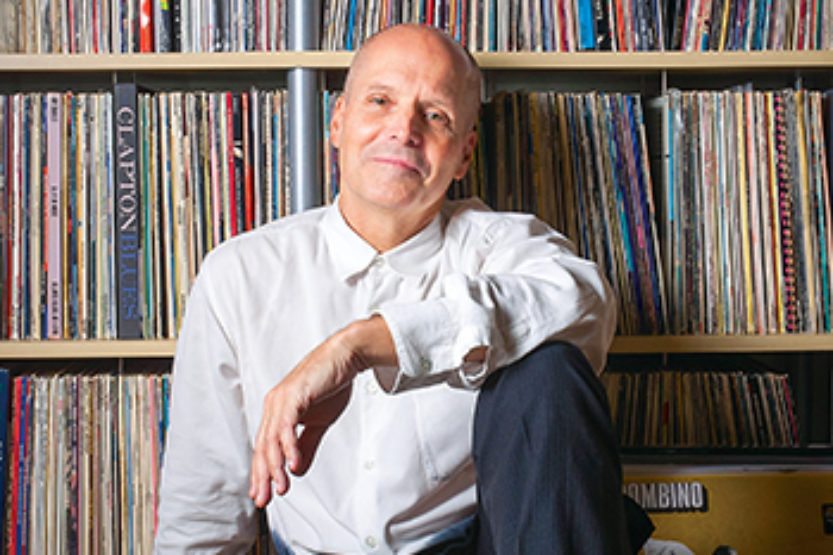Alumni Interview: David Bither
 Music executive David Bither ’76 MEDIA honed his chops at Star Course on the UI campus. Nonesuch Records has won dozens of Grammys. (Image by Steven Halin)
Music executive David Bither ’76 MEDIA honed his chops at Star Course on the UI campus. Nonesuch Records has won dozens of Grammys. (Image by Steven Halin) When I went to my 25-year high school reunion, several people came up to me to say, “You’re about the only person I know who did what he said he would.” And I never said I’d be in the record business, but music was always my passion—I was that kid with a stack of records and the latest issue of Rolling Stone. Even though I got a journalism degree at Illinois, my real major was music.
My first music job was Star Course, the student concert committee. I started out as an usher like everyone else and ran publicity junior year. Then I was one of two people who ran the organization in 1975-76. I was a huge Bruce Springsteen fan and booked him for the fall of 1975 into our 1,000-seat theater for $2,500. Then Born To Run came out, he was on the cover of TIME and Newsweek, and somehow our deal got canceled—one of my earliest educations into the hard reality of the music business. My staff made me a T-shirt: “I Booked Bruce Springsteen Before He Was on the Cover of TIME and Newsweek.”
We also did Bonnie Raitt with Tom Waits, and here’s why professional promoters loathe dealing with organizations like ours: I went backstage after Tom’s opening set, and he said, “Siddown, kid, have a drink!” I got smashed with Tom back there and didn’t even see Bonnie Raitt until stumbling out with Tom when he went up to sing on her last song. Professional? No. Memorable? Absolutely.
Chasing passions opens doors, which can work out in ways you didn’t expect.
During graduate school at Wisconsin, I got internships at WNET and the Lincoln Center in New York. After graduation, I went to work doing fundraising for the Brooklyn Academy of Music while playing in bands, writing for New York Rocker magazine and not sleeping much. None of that really panned out, and by my mid-20s, I was collecting unemployment while trying to figure out what to do with my life—every mother’s dream! But I got a job doing corporate communication for Warner Communications. Warner oversaw the greatest labels on Earth—Warner Brothers, Atlantic, Elektra—and I was in the same building. A friend told me, “You should meet Bob Hurwitz, you guys are the two biggest music snobs I know.” Bob was running ECM Records, a very successful “alternative jazz” label. A year later, Bob was brought in to run the classical label Nonesuch and was looking for someone to be his No. 2. I told him, “I’ve got a great idea: me.” I didn’t get that job, but I worked with Nonesuch unofficially for no pay until getting a job at Elektra. Then I moved over to run Nonesuch at the end of ’94, and it was the setup I’d always dreamed about.
It’s going to sound naive, but Nonesuch’s philosophy is to work with the greatest artists you can find. Chasing passions opens doors, which can work out in ways you didn’t expect. Like [the album] Buena Vista Social Club—that came about through one of our former acts, John Zorn. John told me about Nick Gold, who was doing incredible African music. When we met in 1997, Nick told me about going to Cuba to record [guitarist] Ry Cooder with some old Cuban musicians. “That sounds cool,” I said. We put it out, and Buena Vista Social Club is the biggest-selling world-music record ever.
Wilco came to us because Jeff Tweedy was a huge fan of [minimalist composer] Steve Reich. So even though we seemed like an unusual choice for Wilco, we made sense. The Black Keys were like that, too. I greatly admired that band but never imagined we’d be right for them. Then I met Dan Auerbach, he mentioned [African guitarist] Ali Farka Touré, and here we are again. Even though Black Keys are outside our normal comfort zone, that connection to other music was what we had in common. They’re one of the biggest bands in the world now, which nobody would have predicted.
The challenge to every label is what’s happened to the business the last 20 years, with Napster and file-sharing and iTunes and Spotify. How artists and labels get paid is a huge issue because compensation is dramatically less for online sales and streaming, and how to manage that is a real question. Can we be a part of sorting out a workable model for the industry?
That is today’s moment of truth. I can’t tell you the answer, but we’ve been well-served by doing business the way we have. Last year was our most successful ever. Great work is still being done, and its importance to people is still the same. There’s reason for optimism.

